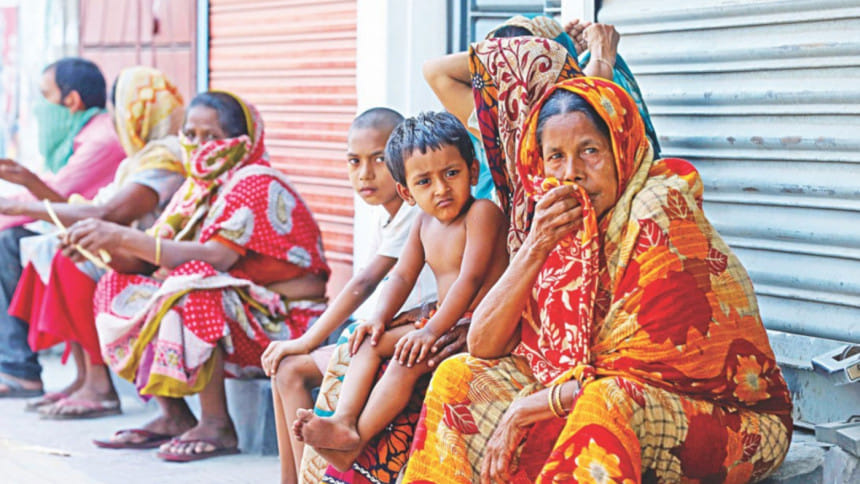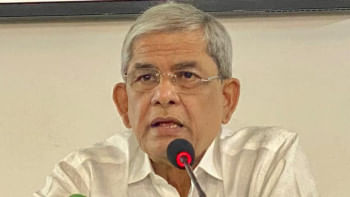Women’s access to stimulus packages and post Covid-19 gender equality

All crises—natural disasters, wars, pandemics—affect different sections of people in different ways. Like any other crisis, Covid-19 has differing impacts on society. It has affected men and women, rich and poor, and adults and children differently. Since the ramifications of the coronavirus pandemic vary across people, measures towards the recovery from this crisis should also be focused towards each section of society distinctively.
Since the outbreak of coronavirus, several studies have revealed that the pandemic is not gender blind. They have indicated how the extent of women's sufferings is more than that of men. Women have been the hardest hit both economically and socially. Women, being at the frontline of the crisis as healthcare workers, as caregivers at home, and as managers of the household, are having to bear the brunt of the coronavirus crisis more intensely than anyone else.
In Bangladesh, more than 85 percent of women are engaged in the informal sector to earn their livelihoods. Thus, a large number of women workers became unemployed overnight when the country went under lockdown. Most of them are yet to get back their jobs even though the economy has started to open up gradually. During the ongoing pandemic, domestic violence has also increased as economic stress and frustrations rose in the face of job losses. Girl children are being married off by poor parents as educational institutions are closed. Only a handful of urban schools can offer technology based online education to a privileged group of students. This could reduce the educational attainment of girls and reverse gender parity in primary education, which was achieved over the last few decades. Early marriage among girls will also increase their health risks, as they would become mothers at a very young age. Thus, the maternal mortality rate can rise too. While the wrath of the pandemic continued for the last six months, severe monsoon floods recently affected at least 50 million people's lives and livelihoods in Bangladesh. Women and girls are again among the most vulnerable groups during such natural disasters.
In view of the negative impact of Covid-19, the government of Bangladesh has taken initiatives to support the affected sectors of the economy through various stimulus packages. It has announced a number of stimulus packages amounting to more than Taka one trillion, which is equivalent to about 3.7 percent of Bangladesh's GDP. These packages, which are mainly credit facilities to businesses by banks, have been allocated for export-oriented sectors, the service sector, cottage, micro, small and medium enterprises (CMSMEs), large businesses, the agriculture sector and pre-shipment loan refinancing.
The government has allocated a share from the stimulus for the CMSMEs (Tk 20,000 crore) of women entrepreneurs. They will receive five percent of the total CMSME allocation, which is equivalent to Taka 100 crore. The recognition of women entrepreneurs' needs in the CMSME category is well appreciated, especially since women entrepreneurs have been demanding dedicated support for the revival of their businesses. However, the overall disbursement of most stimulus packages is still not encouraging. This is no different in the case of women entrepreneurs also—the majority of them have not been able to receive the benefits of the credit support provided to them. The central bank has advised banks to disburse loans to affected businesses on the basis of bank-client relationships.
This is not working. There are a number of issues attached to loan disbursement to women. First, many micro and small entrepreneurs do not have records of bank loans, and thus there is no record of loan servicing or relationships with banks on this ground. Despite several dedicated loan schemes for them from many commercial banks, many women still find the procedures complex and do not feel encouraged to go to banks for loans. Second, many banks are not interested to give loans to women entrepreneurs. Banks do not find women's business proposals bankable as their ticket size is small, which will increase banks' operational costs. Third, banks are also not sure whether their loans will be repaid in time. Fourth, a large number of women entrepreneurs do not have collaterals to take loans. Fifth, access to information is limited to many women entrepreneurs outside big cities.
However, during the Covid-19 period, these small entrepreneurs will not be able to stay on course without government support. Except a handful of women entrepreneurs who have been fortunate to have their families support them, the others have been facing challenges throughout their journey. Barring a few in the urban areas, families take a skeptical view when a woman proposes to become an entrepreneur. Thus, many do not receive financial support from their families either. With limited financial and operational capacity, women entrepreneurs have fallen into a dire situation during the pandemic.
Banks are yet to appreciate the underlying challenges of small women-led enterprises. In this respect, the role of a number of organisations such as Microcredit Regulatory Authority (MRA), Palli Karma Sahayak Foundation (PKSF), Small and Medium Enterprise (SME) Foundation, and Bangladesh Small and Cottage Industries Corporation (BSCIC) is critical. These organisations can help identify women entrepreneurs across the country who are often outside the radar of financial institutions. Associations of women entrepreneurs can also facilitate the process and guide women entrepreneurs in accessing the stimulus package.
It is now well established that the recovery from the fallout of Covid-19 will be a long and arduous process. While the government has attempted to support the affected sectors through credit-based stimulus packages, its implementation will have to be monitored carefully so that stimulus packages do not create further inequality, not only between the rich and the poor, but also between men and women.
We must not forget that the high economic growth in Bangladesh during the past years has been on the back of its hardworking people. In this journey of economic prosperity, the contribution of Bangladeshi women cannot be undermined. Over the years, women's participation in the labour force has increased and the nature of activities performed by women has also changed. They are not only working in traditional sectors, but many have stepped into non-conventional jobs and businesses. Supportive policy measures from the government of the day have also contributed to Bangladesh's economic and social achievements. This has helped to lift a large number of people out of poverty and has also contributed towards gender empowerment.
In order to protect the progress made so far and to reverse the damaging impact of the pandemic on gender equality, government policies should be crafted through a gender lens. The private sector and women entrepreneurs themselves should also be part of the recovery planning. Economic prosperity cannot be sustained by ignoring women's problems and by keeping women outside the economy. Since the objective of the post-pandemic recovery plan is to "build back better", policymakers will have to create more opportunities for women to regain the momentum on gender empowerment and gender equality that was created before the coronavirus pandemic.
Dr Fahmida Khatun is the Executive Director at the Centre for Policy Dialogue

 For all latest news, follow The Daily Star's Google News channel.
For all latest news, follow The Daily Star's Google News channel. 



Comments